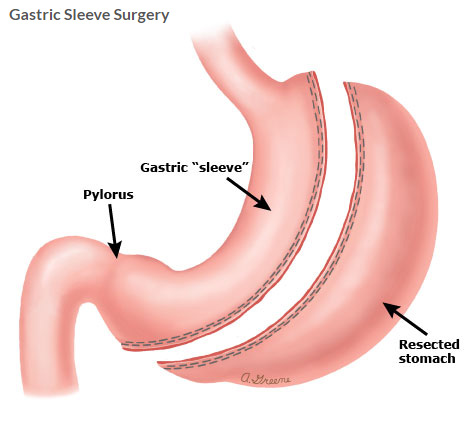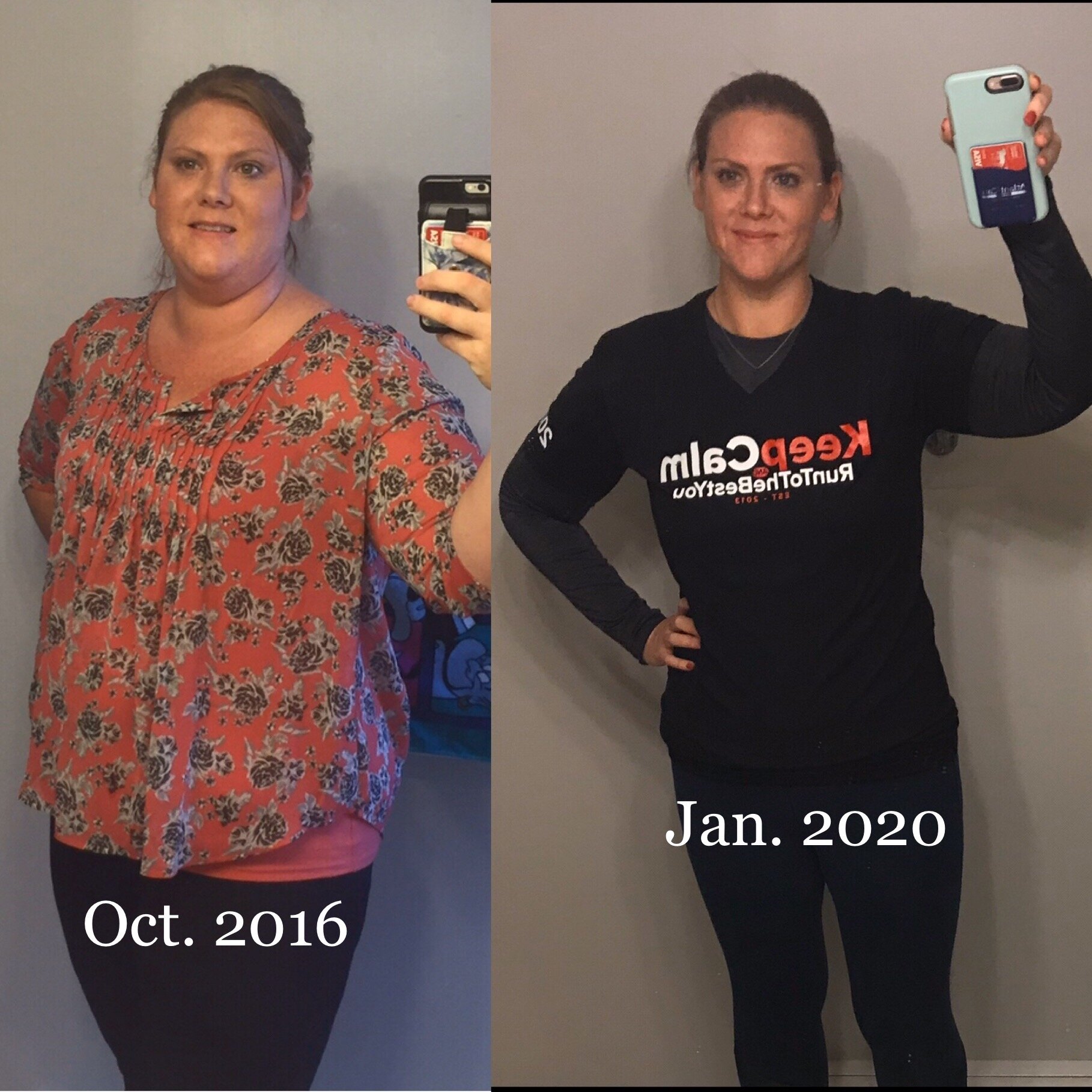Your Weight Loss Journey Starts Here: A Comprehensive Guide to Gastric Sleeve Surgery
Important start to know about gastric sleeve and weight loss surgery
Is Gastric Sleeve Surgery Right for You?

Gastric sleeve surgery can be a life-changing procedure for individuals struggling with obesity. However, it is crucial to determine if it is the right option for you. It is typically recommended for individuals who have a body mass index (BMI) of 40 or higher, or a BMI of 35 or higher with obesity-related health conditions. Consulting with a healthcare professional is essential to evaluate your overall health, discuss potential risks and benefits, and determine if you meet the criteria for this surgery. This personalized assessment will help you make an informed decision about pursuing gastric sleeve surgery and embarking on your weight loss journey.
Introduction to Gastric Sleeve Surgery

Gastric sleeve surgery, also known as sleeve gastrectomy, is a surgical procedure that helps individuals struggling with obesity to achieve significant weight loss. During the procedure, a large portion of the stomach is removed, leaving behind a sleeve-like structure. This smaller stomach restricts the amount of food that can be consumed, leading to reduced calorie intake and weight loss. The surgery is typically performed laparoscopically, using small incisions and specialized instruments. Gastric sleeve surgery is a highly effective and safe option for those experiencing obesity-related health issues and looking to embark on a transformative weight loss journey.
Benefits and risks of Gastric Sleeve Surgery

Gastric sleeve surgery offers numerous benefits for those struggling with obesity. The procedure can lead to significant weight loss, improvement in obesity-related health issues such as diabetes and high blood pressure, and increased quality of life. Additionally, the surgery is minimally invasive, resulting in shorter hospital stays and quicker recovery times compared to other weight loss surgeries. However, like any surgical procedure, there are potential risks to consider. These include infection, bleeding, complications with anesthesia, and potential long-term complications such as vitamin deficiencies. It is important to thoroughly discuss these risks with a healthcare professional before making a decision.
Preparing for Gastric Sleeve Surgery

Preparing for Gastric Sleeve Surgery: Prior to undergoing gastric sleeve surgery, patients must go through a thorough consultation and evaluation process with their healthcare team. This includes meeting with a surgeon, dietitian, and other specialists to assess the patient's overall health and determine their readiness for the procedure. In addition to the medical evaluation, patients will need to make significant lifestyle changes, including following a pre-surgery diet and adopting healthy habits. These changes may include reducing calorie intake, increasing physical activity, and quitting smoking. Preparing mentally and emotionally for the surgery is also crucial, as it involves commitment to lifelong dietary and lifestyle changes.
Consultation and evaluation process

The consultation and evaluation process is a crucial step in preparing for gastric sleeve surgery. During this process, patients will meet with a team of healthcare professionals, including a surgeon, dietitian, and other specialists. They will assess the patient's overall health, review medical history, and conduct various tests and examinations to determine their readiness for the procedure. This comprehensive evaluation helps identify any potential risks or complications and ensures that the patient is a suitable candidate for gastric sleeve surgery. The healthcare team will also provide guidance and support, addressing any concerns or questions the patient may have.
Pre-surgery diet and lifestyle changes

Before undergoing gastric sleeve surgery, patients are typically required to make significant changes to their diet and lifestyle. This is essential to prepare the body for the procedure and maximize the chances of success. Patients will be advised to follow a low-calorie, high-protein diet to help reduce liver size and improve surgical outcomes. They may also be required to stop smoking and limit alcohol consumption to reduce the risk of surgery-related complications. Additionally, adopting regular exercise habits and developing healthy coping mechanisms are encouraged to promote long-term weight loss and maintenance. Following these diet and lifestyle changes can contribute to a more successful and sustainable weight loss journey after gastric sleeve surgery.
The Gastric Sleeve Surgery Procedure

The gastric sleeve surgery procedure, also known as sleeve gastrectomy, involves the removal of a portion of the stomach to create a smaller, banana-shaped pouch. This reduces the stomach's capacity for food intake, leading to weight loss. The surgery is typically performed laparoscopically, using small incisions and a camera-guided scope. The surgeon uses specialized instruments to remove a majority of the stomach, leaving behind a smaller stomach sleeve. This minimally invasive approach reduces scarring and allows for a quicker recovery. The procedure generally takes around one to two hours to complete.
Overview of the surgical process
:max_bytes(150000):strip_icc()/GettyImages-5086258531-dd8d7dd50d0e41b9a134eaa2ba1d3fa7.jpg)
During the gastric sleeve surgery procedure, the patient is placed under general anesthesia. The surgeon makes several small incisions in the abdomen and inserts a laparoscope, which allows them to view the internal organs on a monitor. Using specialized instruments, the surgeon removes approximately 75-80% of the stomach, leaving behind a slender sleeve. The incisions are then closed with sutures or staples. The surgery typically takes around one to two hours to complete. This minimally invasive approach reduces scarring and leads to a quicker recovery for the patient.
Recovery and post-operative care

After gastric sleeve surgery, proper recovery and post-operative care are crucial for a successful outcome. Patients typically spend a day or two in the hospital after the procedure. During this time, they are closely monitored for any complications. Pain medication and a liquid diet are prescribed to manage discomfort and aid in healing. Gradually, patients will transition to a pureed diet, followed by soft foods, and eventually regular solid foods. It is important for patients to follow the recommended dietary guidelines and attend regular follow-up appointments with their healthcare team to ensure proper healing and weight loss progress. Additionally, incorporating physical activity into daily routines and seeking emotional support can further enhance the recovery process and promote long-term success.
Life After Gastric Sleeve Surgery

Life after gastric sleeve surgery involves significant changes in diet and lifestyle. Patients must adhere to a strict post-surgery diet plan, which includes consuming small, frequent meals and avoiding high-calorie, sugary foods. It's important to prioritize protein intake to support healing and muscle maintenance. Regular exercise, such as walking or light cardio, is recommended to aid in weight loss and increase stamina. Patients also benefit from ongoing support and counseling to address emotional and psychological aspects of their weight loss journey. With dedication and commitment to making healthy choices, patients can achieve long-term success in their weight loss goals.
Diet and nutrition post-surgery

After gastric sleeve surgery, patients must adhere to a specific diet plan to support their weight loss journey. The post-surgery diet typically consists of consuming smaller, frequent meals that are high in protein and low in fat, sugar, and carbohydrates. Patients should prioritize lean protein sources such as poultry, fish, and tofu, and avoid foods that may cause discomfort or hinder weight loss. It is essential to follow the dietary guidelines provided by the healthcare team to ensure proper healing, maintain muscle mass, and achieve optimal weight loss results. Regular follow-ups with a registered dietitian can also provide ongoing support and guidance.
Physical activity and lifestyle adjustments

After gastric sleeve surgery, incorporating regular physical activity into your daily routine is crucial for maintaining weight loss and overall health. Start with low-impact exercises such as walking or swimming, gradually increasing intensity and duration as advised by your healthcare team. Aim for at least 150 minutes of moderate-intensity aerobic activity per week, along with strength training exercises to build muscle and improve metabolism. Additionally, making positive lifestyle adjustments such as managing stress, getting sufficient sleep, and practicing mindful eating can further support your weight loss journey and long-term success.
Success Stories and Tips

Many individuals have achieved significant weight loss and improved their overall health after undergoing gastric sleeve surgery. These success stories serve as inspiration for those considering the procedure. It's important to remember that each person's journey is unique, and results may vary. To maintain weight loss and healthy habits, support from healthcare professionals, family, and friends is crucial. Some tips for success include sticking to the recommended post-surgery diet and exercise plan, attending regular follow-up appointments, and seeking emotional support when needed. Remember, small steps forward can lead to big transformations.
Real-life experiences with Gastric Sleeve Surgery

Real-life experiences with Gastric Sleeve Surgery:
Many individuals who have undergone gastric sleeve surgery have shared their personal stories of transformation and weight loss success. These individuals have often struggled with obesity and related health issues before deciding to undergo the procedure. They have reported significant weight loss, improved overall health, and increased self-confidence. By following the recommended post-surgery diet and exercise plan, these individuals have been able to maintain their weight loss and adopt healthier habits. Their success stories serve as inspiration for others considering gastric sleeve surgery as a tool for their own weight loss journey.
Tips for maintaining weight loss and healthy habits

Once you have undergone gastric sleeve surgery and achieved your desired weight loss, it is important to maintain your progress and adopt healthy habits for long-term success. Here are some tips to help you maintain your weight loss and embrace a healthy lifestyle:
- Follow a balanced diet: Stick to a diet that is rich in lean proteins, fruits, vegetables, and whole grains. Avoid high-calorie and processed foods.
- Portion control: Practice portion control to prevent overeating. Use smaller plates, bowls, and utensils to help control your portions.
- Regular physical activity: Incorporate regular exercise into your routine, such as walking, cycling, or swimming. Aim for at least 30 minutes of moderate-intensity exercise most days of the week.
- Stay hydrated: Drink plenty of water throughout the day to stay hydrated and help control your appetite.
- Keep a food diary: Track your food intake and monitor your progress. This can help you to identify any patterns or triggers that may lead to unhealthy eating habits.
- Seek support: Join a support group or seek counseling to help you stay motivated and accountable throughout your weight loss journey.
Remember, maintaining weight loss is a lifelong commitment. By adopting these tips and making healthy choices, you can continue to enjoy the benefits of gastric sleeve surgery and lead a fulfilling, healthy life.
Conclusion

In conclusion, gastric sleeve surgery is a viable option for individuals seeking sustainable weight loss and improved health. The procedure offers numerous benefits, including reduced hunger, increased satiety, and improved metabolic health. However, it is essential to thoroughly evaluate the risks and benefits and make an informed decision. Preparing for the surgery includes consultation and adoption of a pre-surgery diet and lifestyle changes. Recovery and post-operative care are crucial for a successful outcome. Maintain a balanced diet, incorporate regular exercise, and seek support to ensure long-term weight loss success. Remember, gastric sleeve surgery is a tool, and adopting healthy habits is the key to maintaining weight loss and leading a fulfilling life.
Key takeaways from the guide

In summary, this comprehensive guide to gastric sleeve surgery has highlighted several key takeaways. Firstly, gastric sleeve surgery can be a beneficial option for individuals seeking sustainable weight loss and improved health. It offers benefits such as reduced hunger, increased satiety, and improved metabolic health. However, it is crucial to thoroughly evaluate the risks and benefits before making a decision. Preparing for the surgery involves consultation, evaluation, and adopting a pre-surgery diet and lifestyle changes. Recovery and post-operative care are equally important for a successful outcome. Maintaining a balanced diet, incorporating regular exercise, and seeking support are essential for long-term weight loss success. Remember, gastric sleeve surgery is a tool, but adopting healthy habits is the key to maintaining weight loss and leading a fulfilling life.
Additional resources for support and information

Additional resources for support and information regarding gastric sleeve surgery can be a valuable asset during your weight loss journey. Here are some recommended sources:
- Bariatric surgery support groups: Joining support groups comprised of individuals who have undergone or are preparing for gastric sleeve surgery can provide encouragement, advice, and a sense of community. These groups often meet in person or online, allowing for open discussions and the opportunity to learn from others' experiences.
- Professional healthcare providers: Consulting with qualified healthcare providers, such as bariatric surgeons and registered dietitians, can provide personalized guidance and support specific to your needs and goals. They can offer expert advice on diet, exercise, and other lifestyle adjustments post-surgery.
- Online forums and websites: There are various online platforms, forums, and websites dedicated to gastric sleeve surgery and weight loss journey. These resources offer a wealth of information and the opportunity to connect with others who have undergone the procedure. They often provide informative articles, success stories, tips, and support from a community of like-minded individuals.
Remember that each individual's weight loss journey is unique, and it is vital to consult with healthcare professionals and seek information from reputable sources to ensure you are making informed decisions and receiving appropriate support throughout your gastric sleeve surgery experience.

